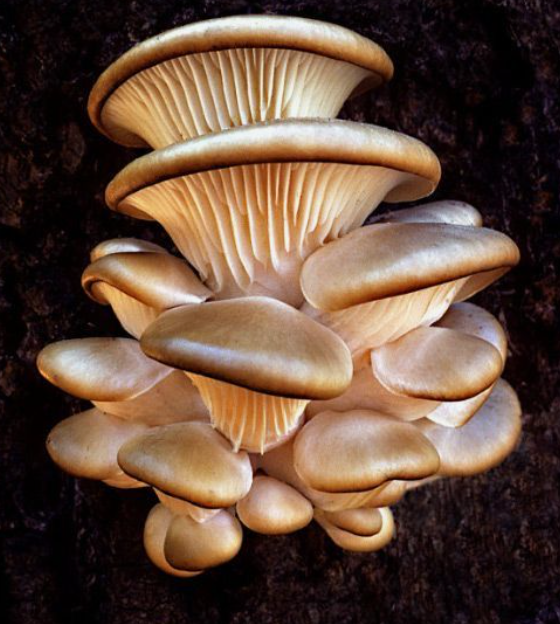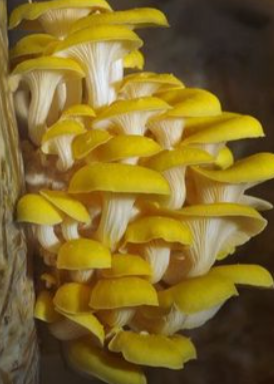Oyster mushrooms (Pleurotus spp.) are an incredible genus that comes in many colors, are very easy to grow, and, according to Hobbs, are the third most cultivated mushroom in the world. They’ll grow in substrates ranging from supplemented sawdust to straw to toilet paper rolls and coffee grounds, making them an easy choice, especially for beginners.
Still, the concept of “easy to grow” is a relative term. Mushrooms aren’t philodendrons. They require some specialized spaces and techniques, along with a bit of extra effort. So what’s in it for the grower? What are the benefits of growing oysters and other mushroom varieties? Read on!
Oyster mushrooms are absolutely packed with nutrients.
According to Hobbs and other sources, oyster mushrooms are very nutritious. Some species contain up to 35% protein. They’re very digestible and high in fiber & minerals, containing 15-20% beta-glucans. Stamets notes that oyster mushrooms contain high amounts of vitamins B, C, and niacin. Healthline gives this nutritional breakdown for 1 cup (85 grams) of fresh oyster mushroom:
- Calories: 28
- Carbs: 5 grams
- Protein: 3 grams
- Fat: <1 gram
- Fiber: 2 grams
- Niacin: 27% of the Daily Value (DV)
- Pantothenic acid (vitamin B5): 22% of the DV
- Folate: 8% of the DV
- Choline: 8% of the DV
- Potassium: 8% of the DV
- Iron: 6% of the DV
- Phosphorus: 8% of the DV
- Zinc: 6% of the DV
In addition, in these days of inflation, mushrooms can be a valuable meat substitute.
(Looking for more information on improving your self-resilience? Check out our free QUICKSTART Guide to building a 3-layer food storage system.)
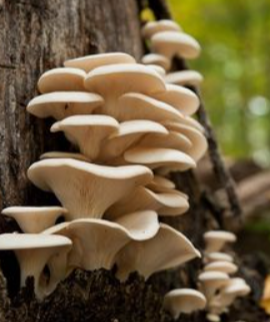
Then there are the medicinal benefits!
The Healthline article quoted above, along with both Stamets and Hobbs, discusses various studies that suggest a role for oyster mushrooms in blood sugar regulation. Hobbs notes the presence of natural statins in these, most notably a molecule closely related to lovastatin. He also notes possible benefits in cholesterol lowering and atopic dermatitis along with mild immunomodulating effects. Some preliminary studies have even shown a possible anti-tumor effect along with anti-inflammatory properties and positive effects on gut health. So what’s not to love?
MedicineNet points out several of these benefits and more, including heart health benefits and the inhibition of free radicals. Both this article and Hobbs point to studies showing that the blood regulation properties of this mushroom can help prevent type 2 diabetes.
Hobbs relates a small study of volunteers with type 2 diabetes who ate 3-4 grams of freeze-dried and powdered oyster mushroom followed by 75 grams of glucose in 300 mL of water for two weeks. Blood sugar levels declined by 15-16.5% compared to controls, while insulin levels increased by 21-22%. He himself notes, however, that human studies are few and far between enough to warrant some caution.
He also notes immunomodulating, anti-inflammatory, and antiallergic effects in children with recurrent respiratory viruses. Interesting! Aren’t we, as a global society having problems with these? SARS-Cov-2 and RSV are respiratory viruses.
If you’re a farmer or homesteader, the used substrate also generates several useful by-products.
According to Stamets, the spent straw can be fed to chickens, pigs, and cattle. Mycelial substrate is also great for building compost and new soil! This is especially good to know when I have to toss a moldy sawdust block. At least something good will come from my efforts, if not what I was trying to grow!
Straw, sawdust blocks, and coffee grounds can be tossed into the compost bin or added to trenches and lasagna gardening layers. Stamets notes that at least five oyster species secrete metabolites toxic to nematodes. Additionally, the spent straw can be used to grow wine caps outdoors. Wine caps, in addition to being yummy, are also used in mycoremediation, a fancy word for cleaning pollutants out of soils via fungi. Be aware, however, that any mushroom used for this purpose should not be eaten, as the pollutant(s) will be stored within the mushroom.
There are, however, some disadvantages and side effects of oyster mushrooms to be aware of.
The mushrooms are quick to spoil, so once you pick them, either dehydrate or use them! They won’t last more than a couple of days in the refrigerator.
Stamets notes that these attract flies to the grow room like no other species, and I can validate that! The flies are attracted to the heavy spore load. Flies carry mold, which can contaminate the entire growing area. These mushrooms drop spores to the point that can be a health hazard, which is one good reason to keep a good filter over your duct fan’s outflow in your Martha tent.
According to MedicineNet, they may cause allergies and are not for sensitive stomachs.
Hobbs notes that there are a few toxic look-alikes, so be very careful if you go foraging! I cannot recommend a good field guide enough! Even better, take a class from someone local who can help you. I know a woman locally who’s poisoned herself twice by eating the wrong mushroom, and she assured me that it wasn’t fun! So be careful! Some of those look-alikes are lethal.
Oyster mushrooms are an incredible genus.
They’re easy to grow and have a wide variety of both nutritional and medicinal benefits. However, I cannot emphasize enough that we here at The Organic Prepper DO NOT give medical advice! My purpose in this article is to present information. What you, the reader, choose to do with that information is purely and solely up to you.
Do you grow your own mushrooms? Do you have any tips or questions? What are your thoughts on oyster mushrooms in particular? Tell us in the comments below!
source: https://www.theorganicprepper.com/oyster-mushrooms-health/
8 INCREDIBLE OYSTER MUSHROOM BENEFITS FOR IMMUNE HEALTH
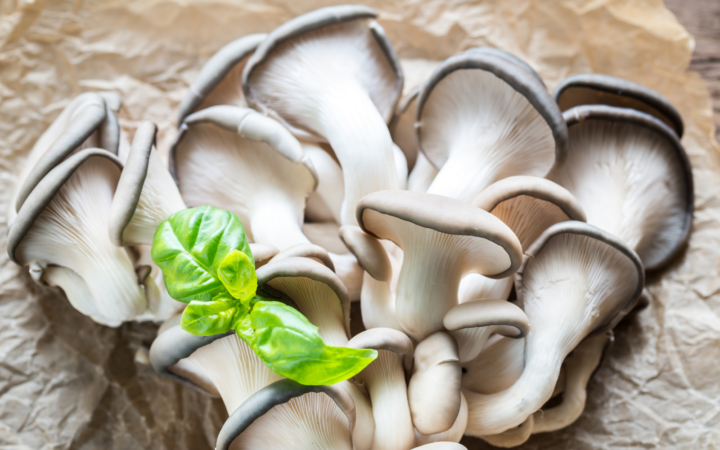
You’ve probably seen oyster mushrooms listed as an ingredient in your favorite stir-fry, but did you know these fungi are also loaded with nutrients?
It’s true.
Oyster mushrooms come in several distinct types and each one of them is packed with antioxidants, vitamins, and minerals to keep your body healthy and defend against disease.
Here’s everything you need to know about oyster mushroom benefits, other medicinal mushrooms, and how to include more oyster mushrooms in your diet.
TYPES OF OYSTER MUSHROOMS
The traditional Oyster Mushroom is Pleurotus ostratus- this is the one you are likely to find at the grocery store… but there are many different types of Oyster.
- King oyster mushrooms: The biggest oyster mushroom found in the Middle East, North Africa, and Asia.
- Pink oyster mushrooms: Bright pink color that fades when exposed to heat, with a pungent flavor. Can taste like bacon if cooked right!
- Phoenix oyster: Looks and tastes like pearl oyster mushrooms but slightly smaller.
- Golden oyster: Bright gold color and a vibrant flavor to match. Very delicate and short shelf life.
- Blue oyster: Despite having a bluish tint, they taste exactly like pearl oyster mushrooms.
- Pearl oyster: The most common type you’ll find in North America.
Each type of oyster mushrooms may have slightly different nutritional values.
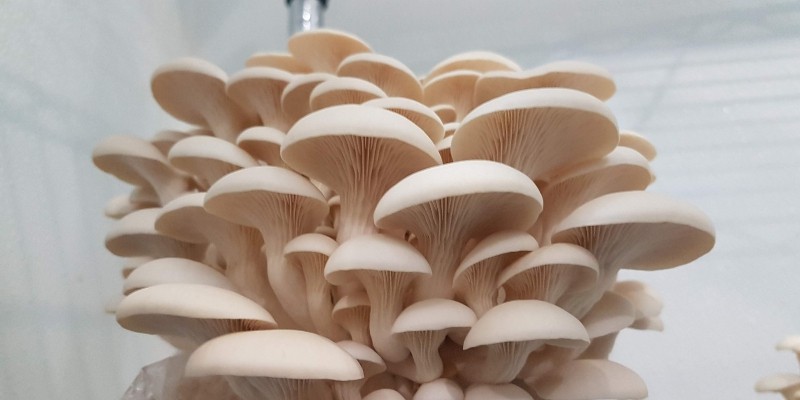
THE NUTRITIONAL VALUE OF OYSTER MUSHROOMS AND BENEFITS
Most of the incredible oyster mushroom health benefits come from its awesome nutritional profile.
Mushrooms, in general, are excellent for overall health and weight loss because they’re low in calories and fat with absolutely no cholesterol.
Oyster mushrooms are no different, boasting just 28 calories per one-cup serving with 1g fat, 2g dietary fiber, and 3g protein.
Beyond the basics, oyster mushrooms also have decent nutritional value thanks to their wide range of vitamins, minerals, and antioxidants.
- Niacin: Almost every cell in the human body requires niacin to function and metabolize other nutrients.
- Vitamin D: Vitamin D is not easy to find in food products (it typically comes from sunlight). However, mushrooms treated with UV lights are one of the best food sources of vitamin D.
- Iron: Red blood cells require iron. One cup of oyster mushrooms gives you 12% of your recommended iron intake which makes them a great meat substitute in that respect.
Oyster mushrooms also contain 8% each of your daily recommended amount of important nutrients like
- Riboflavin
- Potassium
- Vitamin B6
- B Vitamins
- Folic acid (folate)
- Magnesium
- Vitamin C
- Pantothenic acid
- Amino acids
8 HEALTH BENEFITS OF OYSTER MUSHROOMS
Traditional Chinese medicine has understood the value of oyster mushrooms and other medicinal mushrooms for centuries.
Here are some of the most well-researched oyster mushroom benefits.
1. IMMUNE SYSTEM SUPPORT
The beta-glucans in oyster mushrooms make them one of the best foods on the planet for protecting your immune system against short- and long-term illnesses.
Unlike some foods that either stimulate or repress the immune system, mushrooms balance it.
Plus, oyster mushrooms are loaded with other antioxidants to help prevent free radical damage and oxidative stress so your immune system can defend itself against aging.
2. LOWERING HIGH BLOOD PRESSURE
Your body needs nutrients like vitamin D to regulate blood pressure levels.
Did you know that most people who live in cold climates are deficient in vitamin D?
One study found that dietary mushrooms like oysters reduced blood pressure in rats with spontaneous or unexplained high blood pressure.
3. REGULATING CHOLESTEROL LEVELS
Since mushrooms like oysters have a savory flavor and no cholesterol, they’re a great substitute for meat in many sautéed dishes.
One study also found that consuming oyster mushrooms reduced triglycerides and cholesterol levels in diabetic patients (as well as high blood sugar levels).
4. BUILDING STRONG BONES
Oyster mushrooms have plenty of important nutrients for building strong bones. Specifically, vitamin D and magnesium.
While most people focus on calcium, your body also needs vitamin D and magnesium to process calcium and store it in your bones.
5. ANTI-INFLAMMATORY PROPERTIES
The beta-glucans and antioxidants in oyster mushrooms make it a great food for lowering inflammation.
Some research shows that beyond beta-glucans, some of the oyster’s anti-inflammatory properties come from a unique and somewhat unknown amino acid called ergothioneine.
According to the research, ergothioneine lowers “systemic” inflammation across the entire body which often contributes to diseases like dementia and diabetes.
6. ANTI-CANCER PROPERTIES
The beta-glucans in mushrooms like oysters function as potent antioxidants that may protect the body against cancer.
One study found that oyster mushrooms have potential to be effective for certain types of cancer cells.
7. PROTECTING THE HEART AGAINST CARDIOVASCULAR DISEASE
Ergothioneine is also an excellent amino acid for protecting the heart because it prevents the buildup of plaque. Perhaps this is also why oyster mushrooms are able to lower cholesterol levels.
8. DEFEND AGAINST NEURODEGENERATIVE DISEASES
Finally, the amino acid ergothioneine is a cytoprotectant. In other words, it protects cells against oxidative stress and free radical damage.
That’s why mushrooms like oysters have potential for defending against neurodegenerative diseases like Alzheimer’s, Parkinson’s, and dementia.
HOW TO EAT OYSTER MUSHROOMS FOR BENEFITS
Mushrooms should always be washed before cooking.
Give your mushrooms a rinse in chilly water and toss them into a salad spinner or pat them dry with a paper towel.
You won’t want to use the firm parts of the stem for cooking so cut them away. However, you can save the firm parts for other recipes like cooking stocks.
OTHER MEDICINAL MUSHROOMS
Oyster mushrooms aren’t the only fungi with incredible health benefits.
In fact, many of the most medicinal mushrooms you’ve probably never heard of!
Mushrooms like lion’s mane, maitake mushrooms, shiitake, turkey tail, cordyceps, chaga, and others are packed with polysaccharides and beta-glucans as well.
You may not want to eat lion’s mane mushrooms in your stir-fry, because they don’t taste the best. You can, however, consume mushroom extracts and powders in capsules, coffees, and smoothies without sacrificing flavor.
THE BOTTOM LINE
Oyster mushrooms aren’t just a delicious edible mushroom, they’re also extremely nutritious and packed with antioxidants.
It’s easy to include more oyster mushrooms in your diet or find antioxidant-packed medicinal mushroom supplements to defend against cancer, inflammation, and other diseases.



